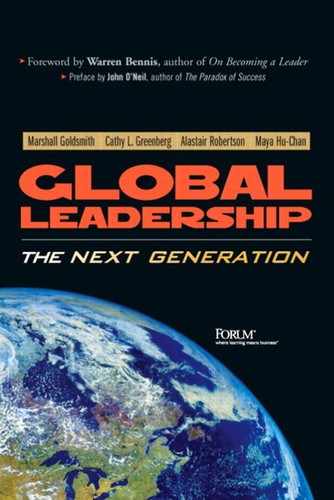Appendix B
The Global Leader of the Future Interview Questions
We suggest that you use these interview questions as an exercise for yourself and those with whom you work. Ask yourself the questions outlined below. Distribute these questions to your teams, peers, employees, coworkers, and managers. Use these questions to promote discussions of leadership and the qualities of leaders that will lead your organization to success.
Personal Leadership Skills
Demonstrating integrity has been and continues in the future to be one of the most highly rated behaviors for leaders. How does one stand out as a role model for living his or her organization's values? What examples of honest, ethical behavior can you provide to show the usefulness of acting in this fashion?
Genuinely listens to others is an almost timeless behavior of a leader. It is a key ingredient of "encouraging constructive dialogue." What can you tell us about your struggles and successes as a listener?
Confidence as a leader continues to be considered an important characteristic of the next generation leader. It is considered a critical aspect of "achieving personal mastery." What examples might you give us regarding your challenges and how confidence has played a part in your eventual success?
Appreciating diversity is an increasingly important attribute for tomorrow's leaders. In fact, the behavior "effectively motivates people from different cultures and backgrounds" was the second highest gainer in importance of the 82 behaviors rated by next-generation leaders. And, the third highest gainer in importance was "appreciates the value of diversity (avoids discrimination). What follows is a two-part question: (1) What type of diversity is needed in tomorrow's organizations? and (2) How do we demonstrate that we value this diversity?
Consistently treating people with respect and dignity is the second highest rated behavior for the next five years. What advice can you give a leader regarding the process of respect and dignity? What should you not do, and what should you do?
The pace of change seems relentless. How does one best challenge the system when change is needed? How does one effectively translate creative ideas into business results?
Team Leadership Skills
Creating a shared vision ties for third place in importance of all leadership behaviors. Can you provide some insight into both the word "vision" and the word "shared?" Vision has often been denigrated as being too ethereal and soft. At the day-to-day level, a useful vision should help people focus on the "vital few," or in other words, to prioritize. How have you seen vision help in the day-to-day running of a business?
One of the top ten behaviors is in the category of building partnerships. This behavior is, "unites his or her organization into an effective team." Assuming a shared vision has been achieved, what else is required for an effective team, and how does leadership shape these requirements?
"Building effective partnerships across the company" and "building effective alliances with other organizations" are the fourth and fifth highest gaining behaviors for the future as seen by next generation leaders. What insight can you provide regarding how to be effective in partnerships and alliances?
Sharing leadership is tricky business. What positive and negative examples do you have with regards to the sharing of leadership? Consider this with business partners and within the organization. From a personal note, where have you utilized people who have strengths that you do not possess?
Developing and empowering people have long been key roles of leadership. In order to leverage the leadership talent in the organization, leaders need to be both developed and afforded the opportunity to lead. What are your thoughts on the right way to develop people? What are your thoughts on the right way to empower those you are developing?
Strategic Leadership Skills
"Understanding the impact of globalization on her or his business" was the number one rated behavior by the next-generation leaders and received the highest overall gain in importance of any of the 82 behaviors. Obviously, this is an immensely important behavior. How do you develop this understanding in the future?
Given that a leader has a workable understanding of the global landscape, what advice can you give regarding anticipating opportunities? How does one extricate oneself out of the present objectives long enough to see future opportunities?
The younger the next-generation leaders were, the more they felt developing technological savvy was important to future success. What are your thoughts on acquiring the technological knowledge needed to affect strategy decisions? How does one manage the use of technology in the organization?
As many leaders are part of organizations that compete, how do you ensure your organization maintains a competitive advantage?
It is only fitting to end with arguably the most important skill set of a leader, the skills that relate to ensuring customer satisfaction. This skill area had the most behaviors rated in the top dozen in terms of importance. These behaviors were "regularly solicits input from customers" (this behavior also was in the top ten in terms of increased importance for the future); "ensures that the organization consistently meets commitments to customers"; and "consistently treats customer satisfaction as a top priority." Additionally, "views business processes from the ultimate customer perspective" made the top dozen in terms of increasing importance for the future.
